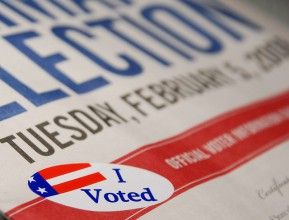Referendums on passed legislation gain steam
Referendums on legislative actions may be making a comeback in California.
Earlier this week, opponents of Senate Bill 277, the mandatory vaccination measure, began their quest to refer that legislative action to the voters for the November 2016 election. Already qualified to appear on that ballot is a referendum on banning single use plastic bags in the state.
Taking on legislative acts via direct democracy is not so common. The first obstacle is the short 90-day period allowed to gather the necessary signatures. Of course, with the low voter turnout in the last gubernatorial election, the number of signatures needed has dropped. Now, obtaining just 365,880 valid signatures will place a measure on the ballot.
While 49 referendums made it to the California ballot between 1912 and the most recent general election in 2014, 34 of those referendums appeared on ballots prior to the end of World War II. If you dismiss the referendums dealing with Indian Gaming and all the money that supporters and opponents on that issue have to help qualify a measure, since 2002, only two referendums have qualified for the ballot — a health care measure in 2004 and a redistricting referendum in 2012.
Now, we could see two on the next ballot. Maybe more.
Elections analyst, Allan Hoffenblum of the California Target Book, told the Los Angeles Times he thinks the vaccination referendum could qualify. “It’s a minority of people but it’s a sizeable minority of people. I would be surprised if it didn’t qualify. There is a lot of intensity.” Hoffenblum said.
While the measure may qualify, it faces big obstacles to overturn the legislative action. Polls indicate support for mandatory vaccination of school children. The PPIC poll in May found that 67 percent of all Californians and 65 percent of parents of public school children support the mandate. Furthermore, while passionate opponents of the law would be good foot soldiers in an effort to get the measure passed, there remains a question of how much money could be raised to deliver the message statewide.
And, while pharmaceutical companies have claimed a distance from the law, they could play a financial role in any ballot contest in support of the law.
In addition, there is the often difficult to understand requirement that if you are for the referendum but against the law you must vote “No.” The referendum essentially asks if you support the law passed by the legislature, “Yes” or “No.” The question is not whether you support the referendum. Voters can be confused.
Could other referendums come along?
Probably the most well-known referendum in California history was the battle over a peripheral canal. Voters overwhelmingly rejected the canal in June 1982. A proposal in the same vein, Gov. Jerry Brown’s push for Delta Tunnels, could face a referendum if legislation passed to move the tunnels plan forward. (There is already an initiative effort that would require a vote of the people on major projects like the tunnels that is in the works. If tunnel legislation becomes law before the initiative is voted upon, opponents of the tunnels may turn to a referendum.)
Then there is SB350 to cut 50 percent of all petroleum use by 2030. If passed this term, could opposing oil companies mount a referendum and ask voters if they agree?
Other major issues that could arise from the special sessions will not face referendums. If tax increases are passed by the legislature, they will become law without opponents having the opportunity to refer that action to voters.
Article 2, Section 9(a) of the state Constitution prohibits referendums “providing for tax levies or appropriations for usual current expenses of the state.”
Gov. Brown has previously indicated that he doesn’t plan to ask voters about a tax increase this time around, and the voters can’t use the referendum power to demand a vote on taxes.
Related Articles
CA may use Prop. 1 water bond to buy enviro water during drought
In the midst of a grueling four-year drought in agriculture, state officials say some $287.5 million in borrowed cash is
Video: Art Laffer: California vs. Texas
There are two types of states in the United States. Some are hiking taxes and others are cutting taxes. Economist
The Complete Guide to John Burton’s Tirades, Outbursts and Expletives
Sept. 4, 2012 By John Hrabe California Democratic Party Chairman John Burton kicked off the Democratic National Convention Monday by





